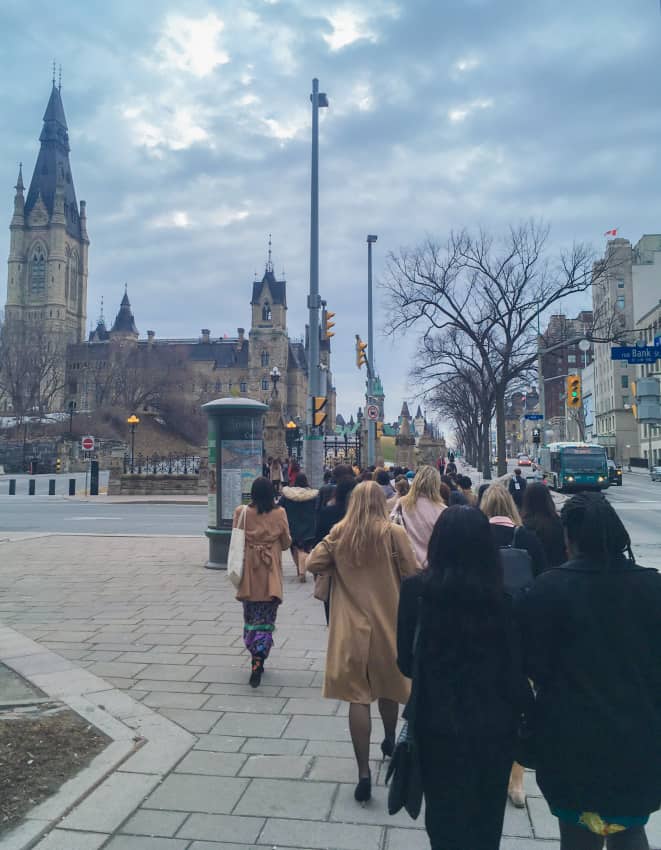
When old white men slam their fists on tables and heckle, it’s called politics, but when young women of colour silently protest, it’s called unprofessional. Speak your truth — unless your truth calls out the government.
Currently, approximately 27 per cent of the House of Commons is female. The Daughters of the Vote delegates, consisting of 338 women and non-
binary folks, took the seat of their Member of Parliament, filling the chamber with more women than have ever been elected in history.
On April 3, it was also noted on social media that women from marginalized communities threw a so-called “tantrum” in the House of Commons, or what I believe to be the house of colonialism since it still is a colonial institution that carries out systemic racism to this day.
This protest was a powerful demonstration made by the Indigenous delegates as they were occupying a space that was not created for them.
I am a Daughter of the Vote delegate, and since then, I have been collecting my thoughts on what happened during my week in Ottawa. I had hoped to feel inspired and rejuvenated after, yet I felt the opposite: exhausted and pessimistic. This event highlighted the progress that must be made to support women seeking election and the criticism that will come with that work.
The 30 delegates selected to speak in the House of Commons used their time to articulate the concerns for their communities. For instance, universal mental health care, climate change and the missing and murdered Indigenous women and girls — issues that have gone unaddressed. If the critics had taken time to listen to the delegates’ speeches, the purpose of the protest would be clear.
The policies and programs that Prime Minister Justin Trudeau and Andrew Scheer support can have negative implications on the delegates’ communities, such as Scheer’s stance on anti-2SLGBTQ marriage. Although there was not just one reason for the protest, the movement was triggered by the ejection of Jody
Wilson-Raybould and Jane Philpott from the Liberal Party caucus.
There was a recurring theme of hypocrisy throughout the event. The delegates were told by some guest speakers, panelists and organizers to speak their truth — a reference to Wilson-Raybould’s testimony on the SNC-Lavalin affair — while simultaneously being pressured into silence by other delegates.
The protest from the Daughters of the Vote delegates was not the only one to occur in the House of Commons this year. On March 19, Andrew Scheer’s Conservatives slammed their fists on tables, stomped their feet and later walked out during the question period when Scheer accused Trudeau of covering up the SNC-Lavalin affair.
It seems that when old white men engage in a heated verbal combat, stomp and walk out of the House of Commons, no one bats an eye. But when women — women from marginalized communities — use their space to demonstrate the frustration they have towards their government officials, it is called unprofessional, disrespectful, shallow and a tantrum.
As a disclaimer, I did not protest, but I wish I did. This movement took a significant amount of courage — courage I could not find in that moment. The delegates did not make these actions with haste, they organized and mobilized.
After the announcement of Wilson-Raybould and Philpott’s removal, about 50 delegates marched to Parliament Hill to create a video showing their solidarity for the MPs. The next day, the protestors used a once-in-a-lifetime opportunity of occupying space in the House of Commons to make powerful statements.
What I can take away from my experience is that being a leader and a political leader are not synonymous. Those in power that are willing to take risks and face the criticism for the decision to speak their truth will be the ones to bring change. Despite the hypocrisy in politics, the delegates did not choose what was easy, they chose what was right.
—
Lauren Klassen
Photo: Lauren Klassen/ Supplied
Leave a Reply